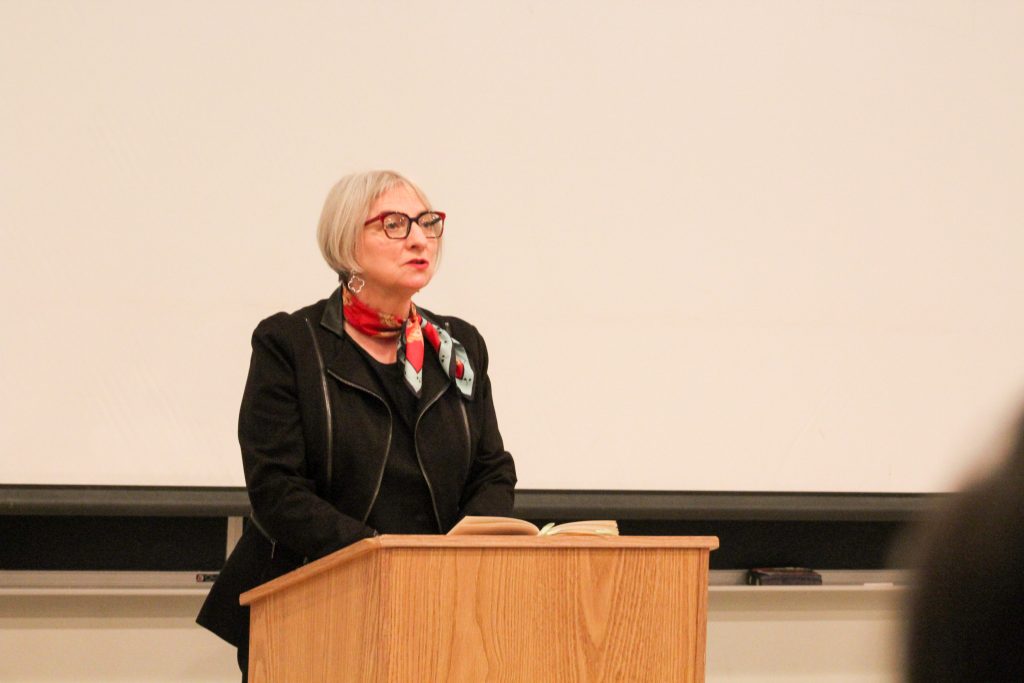
This past Tuesday, March 5, the Binghamton Center for Writers sponsored the most recent installment in its Readers’ Series with guest speaker Molly Peacock, ‘69. A Binghamton University alumna, Peacock’s presentation included poetry recitations, reflections on her life as a renowned poet and advice for the next wave of Binghamton writers.
Peacock graduated magna cum laude with a bachelor’s degree from Harpur College in 1969, later earning a master’s degree at Johns Hopkins University in 1976. She went on to author six books of poetry, the most recent being “The Analyst” in 2017. Although primarily a poet, Peacock has also tried her hand in biography with “The Paper Garden: Mrs. Delany Begins Her Life’s Work at 72”; essays with “The Private I: Privacy in a Public World”; memoir with “Paradise, Piece by Piece” and fiction with “Alphabetique.”
As president of the Poetry Society of America, Peacock brought her love of poetry to public transportation with her Poetry in Motion initiative, which first placed works of poetry within New York City’s buses and subways and eventually in over 20 different American cities. Currently, she serves as the general editor for “The Best Canadian Poetry in English” in Canada. The University library holds her own archive.
Peacock began her talk, held in Fine Arts from 8 p.m. to 9:30 p.m., by reciting her poem “The Flaw,” which critiques the preconceived notion of genius and perfection in poetry.
“There are no perfect poems,” she said. “Poems are handmade objects. And always with something handmade, there is the flaw.”
Most of the poems Peacock chose to recite came from her most recent collection, “The Analyst,” which she dedicated to Joan Stein, her therapist for many years. As a BU student, Peacock went for sessions at Stein’s private practice in the Binghamton area. At the time they met, Stein was also hired as the University’s first sex counselor.
“I had the kind of life where the worst part happened at the beginning,” Stein said. “It took me a long time to put the pieces of myself together. And I needed a lot of help — I was only grown up from the outside.”
Peacock found this help in her lasting relationship with Stein, whose care would endure changes in time and place from Binghamton to New York City to Canada, where many of the sessions were held through the phone. Peacock finds comfort in these types of supportive relationships, citing her annual dinner with her seventh-grade teacher as an example.
Peacock’s appreciation for Stein is evident in the collection, which works Stein’s life story into a profound tribute. The poem “The Analyst Draws” paints a vivid picture of Stein’s history as a near professional artist: “You walked / away from the studio — not to touch / a brush for thirty years. Brushes / you exchanged for words.”
Peacock’s uplifting poetry reflected her encouraging advice to Binghamton’s current undergraduate writers, specifically female writers. She said her experience in academia has made her aware of a need for representation in literature.
“There was this lyric moment on the page and for me, as a young woman, I have to say, well I never had anything other than a white heterosexual male professor here — it was a long time ago,” she said. “I was always looking for a role model, I was combing tables of contents to see if I could find a woman’s name.”
Peacock’s name would later grace several notable tables of contents, including those of “The Oxford Book of American Poetry” and “The Best of the Best American Poetry.”
She insisted that aspiring young writers pursue their goals with strength and tenacity.
“You must be pushing forward, all of you,” she said. “If you’re serious about what you are writing, you must keep pushing on.”


